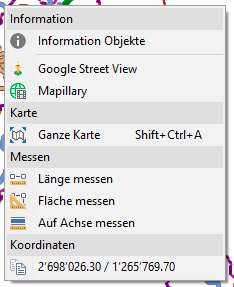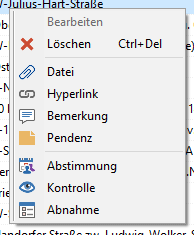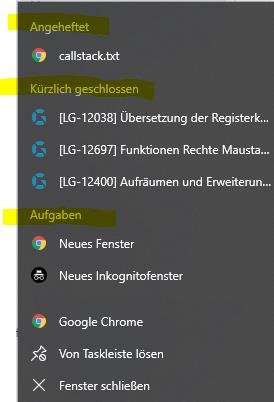

chkaufmann
-
Content Count
167 -
Joined
-
Last visited
Posts posted by chkaufmann
-
-
A TObject has an InstanceSize of 8 bytes. I searched the internet to understand why. 4 bytes would make sence (pointer to the classtype or whatever).
All I find are old postings about this change back in 2009, but is this still valid for the current version? And if the second pointer is available for object locking, can somebody point me to an explanation for this. To be honest, I did not really understand how this works.
Currently I use a "Spring.Lock" in all my objects for thread synchronization, but maybe this is not necessary and I could use the built in lock feature of TObject?
Christian
-
I wanted to try your code, but I just realized that madCodeHook unit is not part of madExcept.
So is there another way or code sample to hook these functions globaly?
Christian
-
This is not what I need. I need a constant so I can exclude code (and put some dummy code) when the unit goes to the package.
Christian
-
Hi,
I use FastMM5 in a unit for logging, however I don't want this unit/code to be compiled into my IDE package.
Is there a predefined constant for an IFDEF to see if my unit is compiled in an application or into a package? Or do I have to create my own constant for this?
Christian
-
I create a handler where I want to subscribe / unsubscribe consumers:
type TBSEvent<T> = reference to procedure(const obj: T); IBSRemoteMessageController = interface ['{1C7ECC50-3CA2-41A0-B230-0E9FE4CF9BE4}'] procedure Subscribe(AHandler: TBSEvent<IBSRemoteMessage>); procedure Unsubscribe(AHandler: TBSEvent<IBSRemoteMessage>); end;
Now in my implementation of IBSRemoteMessageController I keep a list of these events. Unfortunately it looks like when I try to Unsubscribe() I get a different pointer even if I pass the same method.
The only solution I see here is, that I return a key with the Subscribe() method and then pass this key to Unsubscribe(). Or is there a different solution for this problem?
Regards
Christian -
I'm about to build a REST API using a TIdHTTPServer. Now even in the latest version of Indy the command PATCH is not listed in THTTPCommandType.
Is there a reason for that? Or should a just use PUT for all update requests? To be honest when I read in the internet about the differences for PUT, PATCH and POST there are no unique opinions. So maybe I just use POST do add items and PUT for any updates (partial and complete).
Regards
Christian -
Hi,
on my computer I have Kaspersky install by default and I cannot change that. I cannot even change any of the settigs, it's all under control of the system administrators.
They already added my major application (EXE file) as exception under "Trusted applications" but I still have the feeling it takes forever after compiling until linking is done and my application started.
Personally I would like to stop Kaspersky completely, but no chance for that. So is there another setting that should be changed on a developer machine?
Regards
Christian
-
So this fix will be with the Indy version that comes with Delphi 11?
Christian
-
I think, I found the answer myself now:
https://stackoverflow.com/questions/24861793/indy-http-server-url-encoded-request
When I add this code, my search string is correct. So probably nothing changed here since 2014.
Christian
-
I use a TIdHTTPServer and have problems with decoding GET variables.
The url in the browser looks like this (contains cyrillic characters):

Then in the RequestInfo the UnparsedParam and the QueryParams have the value 'search=%D0%90%D0%BD%D1%82%D0%BE%D0%BD&language=ru'
In DecodeAndSetParams this is parsed but I don't get the correct results:

The request comes from the browser and I didn't change any properties. So I'm not sure how to proceed. I think Indy uses the wrong encoding but I'm not aware, where I can change that? And will all browser use the same encoding? Or do I have to Parse the QueryParams myself?
Christian
-
I use Delphi 10.4.2 and the Indy library coming with the default installation.
I found that I can set the "Decode" parameter of ExtractHeaderFields() to false, then it works fine.
Christian
-
Ok, the request that comes with this malformed Content-Disposition is created by another Delphi application where I use Indy components. The code looks like this:
mPartStream := TIdMultiPartFormDataStream.Create; postDataStream := mPartStream; FHttp.Request.ContentType := mPartStream.RequestContentType; for ix := 0 to FPostNames.Count -1 do begin if FPostFiles[ix].IsNull then mPartStream.AddFormField(FPostNames[ix], FPostValues[ix], 'UTF-8').ContentTransfer := '8bit' else mPartStream.AddFile(FPostNames[ix], FPostFiles[ix].PathName, FPostContentTypes[ix]); end;FPostFiles[ix].PathName is the Windows path of a file. Should I encode it on my side? Or do I have to set another parameter to ensure correct encoding?
Christian
-
Hi,
I use ExtractHeaderFields() from Web.HttpApp when I parse a post upload.
With the following value for "Content" (containing special german characters) this function fails:
'form-data; name="File1"; filename="Test1MitäÄ-Umlaut.pdf"'I get this error:
System.SysUtils 33477 TEncoding.GetString System.NetEncoding 1007 TURLEncoding.Decode Web.HTTPApp 2108 ExtractHeaderFieldsNow I'm not sure if the input is wrong or if I have to use a different function to parse the content of this header (Content-Disposition:).
Thanks for any help.
Christian
-
I'm still working with Delphi 10.4.2 and I noticed, that there are two processes DelphiLSP.exe and both take a lot of memory. In addition there is bds.exe which isn't small either.
Is this "by default" or can I change that with changing any of my options?
Christian
-
Both "problems" are solved by setting Enabled=False for the group header item. Like this the color never changes and clicks on it are ignored.
Christian
-
Thanks for all hints.
I created a subclass of TMenuItem and did an override of the AdvancedDrawItem method. In addition I set Enabled=False. Themes are not support, but I don't have that anyway in my application. But so far it looks fine:

procedure TMenuGroupItem.AdvancedDrawItem(ACanvas: TCanvas; ARect: TRect; State: TOwnerDrawState; TopLevel: Boolean); begin ACanvas.Brush.Color := TColors.Silver.Lighten(50); ACanvas.FillRect(ARect); ACanvas.Font.Color := TColors.SysWindowText; ACanvas.TextRect(ARect, ARect.Left + 3, ARect.Top + 3, StripHotkey(Caption)); end;Christian
-
 4
4
-
-
Yes, this is what I need to do (grouping titles).
Regards
Christian -
Ok I added a disabled item ("Bearbeiten") in this case, but it's still aligned with all other items. And setting the Break property just adds a vertical line on the left side:

So what do I have to do to align the "Bearbeiten" Text at the left and to change the text color/background?
Christian
-
Hi,
I would like to add group headers in a TPopupmenu. So I can create things like this:

Are there any properties I didn't find yet in the standard VCL? Or can I do that with some additional methods in a TPopupMenu subclass?
Christian
-
Hi,
in my 10.4.2 installation, the font color for items in the "To-Do" list is just too light and I would like to change it to a gray with a bit more contrast.
Is there a simple way to change that?
Christian
-
It depends on what you plan to do. TatukGIS DK is a very good GIS library. We use it since 20 years. It offers a great map viewer component and the enterprise edition covers all common spatial formats. It's not expensive compared to ESRI products, but it's not cheap either.
If you just have some spatial data in a PostgreSQL/PostGIS database you can build your own SQL statements quite easy. Geometries are represented as WKT which is quite straight forward to understand. But of course it means programming work on your side.
Regards
Christian
-
 2
2
-
-
I have an old project where I use TClientDataSet (unit DBClient.pas). When I recompile this one with Delphi 10.4.2 I get the following hint:
Hint: H2161 Warning: Duplicate resource: Type 16 (VERSIONINFO), ID 1; File Pyramid.res resource kept; file C:\Program Files (x86)\Embarcadero\Studio\21.0\lib\Win32\release\DE\midas.res resource discarded.
Is this a (new) problem in my code or is this an error in the Delphi library code?
Regards
Christian
-
And I can confirm, that this fix works fine for me.
-
I just started to work with 10.4.2 (10.3. before) and have the same problem.
![Delphi-PRAXiS [en]](https://en.delphipraxis.net/uploads/monthly_2018_12/logo.png.be76d93fcd709295cb24de51900e5888.png)
Memory Management with many objects
in General Help
Posted
Thanks, this works.
But for objects only. Is there a general way to count the number of a "record" instance as well?
Christian